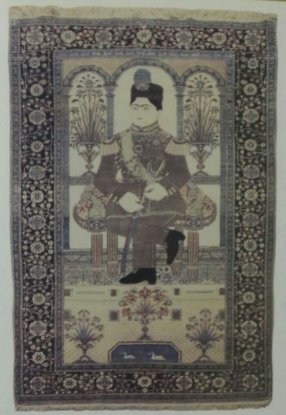name of rug : ahmad shah ghajar
type of tug : kashan
size: 1.95 * 1.36 m
weaver : mohtasham
antiquity : ca 1910 A.D
private collection
name of rug : ahmad shah ghajar
type of tug : kashan
size :1.40 *2.20 m
weaver : mohtasham
antiquity : ca 1900 A.D
private collection
source : The secret of the most elegant and precious rugs in the world
Dr Reza hekmat-nejad





lol most of the so called Persian!! rugs are actually made by the Iranian Turks. Ahmad shah was also the last king of the QAJAR Turkic dynasty. now after him the QAJAR kingdom fell to the Persians hands and they created the country and identity IRANIAN. mostly through confiscating and assimilating every thing from non Persian minorities.
you can check it easily if the rug is made by Persians or Turks. Turkic weavers utilize the knots pattern called as the Turkish knots.
And the funny thing is that it is not sure that today’s Farsis (who call themselves Persian) are exactly the descendants of Farsis many centuries ago. So they can’t and shouldn’t claim everything for themselves just because they learn and speak Farsi as their mother tongue. Non-Fars ethnic groups have far more cultural elements for themselves than Farsis. And these carpets are just one of the many things that are claimed to be Persian but probably if they are investigated, it might come out that they are either Azerbaijani or Turkmeni or Luri carpets, therefore not Persian!
do you have any older proof then pazyrik ? like some thin existing like pazyrik amd not made up stories.
and also those rugs are woven with a cymmetrical knotting’s (persian) and turks are making just flat woven and flat knotted rugs ,that was just for your info
In 1900, Ahmad mirza was NOT shah. The persian king in 1900 was Mozafaredin shah (Ahmad’s grandfather).
The Pazyryk Carpet, the oldest known surviving carpet in the world, 5th century BC.
In a unique archaeological excavation in 1949, the exceptional Pazyryk carpet was discovered among the ices of Pazyryk Valley, in Altai Mountains in Siberia. The carpet was found in the grave of a Scythian prince. Radiocarbon testing indicated that the Pazyryk carpet was woven in the 5th century BC.[14] This carpet is 283 by 200 cm (approximately 9.3 by 6.5 ft) and has 36 symmetrical knots per cm² (232 per inch²).[15] The advanced weaving technique used in the Pazyryk carpet indicates a long history of evolution and experience in this art. Pazyryk carpet is considered as the oldest carpet in the world.[16] Its central field is a deep red color and it has two wide borders, one depicting deer and the other Persian[citation needed] horsemen.
The Pazyryk carpet was thought, by its discoverer Sergei Rudenko, to be a product of the Achaemenids.[17][18] Currently, whether it is a nomadic product with Achaemenid influence, or a product of the Achaemenids remains the subject of debate.the oldest hand made rug belong to persians (pazyrik)